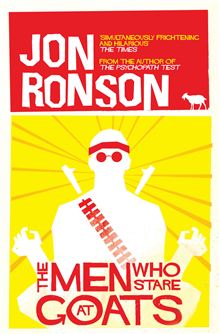It’s all about getting people to talk

The Men Who Stare at Goats
by Jon Ronson
This book was chosen for my book club and I am glad on two counts – it has made me want to watch a film that I dismissed out of hand at the time, and it has introduced me to a writer and journalist I now really really like – and yet I would never have picked it up myself.
The book follows Ronson’s investigation into “psychic spies” within the US Army. The events he unveils run from the 1960s to 2003, when he was writing the book, but the story is not told chronologically, it is told in the order in which he discovered the information, which is a little confusing but also creates the opportunity for Ronson to leave teasers and hints about what’s coming.
But what exactly is he investigating? Well, it begins with the rather bizarre rumour that a secret army unit kept a barn full of goats to train themselves in the art of staring a man to death. Ronson digs and digs and speaks to a LOT of people and discovers that the story is both sillier and far more sinister than it at first sounded.
Essentially, it all begins with Jim Channon, whose experience of war in Vietnam affected him for life. Essentially he became a hippie, but rather than leave the army he stayed and even rose in its ranks, while espousing a new philosophy to his superiors. He suggests that soldiers learn meditation, martial arts, spiritualism and other “non-lethal techniques”.
“It was heartbreaking for Jim to realize that Private First Class Shaw had died because his fellow soldiers were impulsively guileless and kind-hearted, and not the killing machines the army wanted them to be…’The kind of person attracted to military service has a great deal of difficulty being cunning. We suffered in Vietnam from not being cunning.'”
He even wrote a treaty, The First Earth Battalion Operations Manual, a strange combination of inner peace and unusual torture techniques that news reports reveal were being used in Iraq in 2003.
Which is where the book turns from quirky to serious journalism. Not that it is any way tough or hardgoing; Ronson is a very entertaining and engaging writer. He digs out the key details, the anecdotes that bring a person to life.
The book is funny yet disturbing. The concept of “non-lethal” stretches very very far, in fact at one point there’s a conversation about whether it can include something that leads to death a few weeks later.
The shocking part is not that the US Army employed terrible methods of interrogation/torture in Iraq and at Guantanamo Bay; that’s pretty much common knowledge. The surprise is that many of those methods have their roots in hippie pacifism, the same roots that led General Albert Stubblebine III to be convinced that if he could just concentrate hard enough, he’d be able to walk through walls.
“‘That’s what the First Earth Battalion did,’ said Jim. ‘It opened the military mind to how to use music.’
‘So,’ I said, ‘it’s all about getting people to talk in a…in a what?’
‘A psycho-spiritual dimension,’ said Jim. ‘Besides the basic fear of being hit, we have a mental, spiritual and psychic component. So why not use that?'”
Through all the disparate details unearthed by Ronson, the line from crazy hippie to crazy evil is definite if occasionally fuzzy, but the crazy is ever-present. And these aren’t random outliers but respected career professionals within the army.
I loved this book but the reaction at book club was more tempered. There was some frustration at the muddled timeline but also at the lack of any clear conclusion or final revelation. To some extent I think that’s just the nature of this particular beast. The book was published in 2004, while US activity was at its height in Iraq and Guantanamo. The revelations about what really happened there were already appearing in the press and have continued to come out. That’s not the story Ronson is telling, it’s just one facet of it, but because it’s the most awful part it feels a little like a dropped conclusion. If anything, though, the revelation would be whether any of those original founders of the “psychic spies” really were pacifist hippies or if they were just extremely odd and possibly dangerous. And whether the secret unit still exists.
Published 2004 by Picador.
Source: Amazon.
The movie is really good! I haven’t read the book, so don’t know how it compares, but it’s definitely worth a watch.
Marie As I understand it they’re quite different but I still want to see the film.
Im reading a book of his collected non-fiction at the moment and agree he is a really engaging writer.
He does a good job as a journalist who takes really out there subjects but never belittles or judges his subjects and generally sees the good in people even if their actions and world view is…..questionable! I think this forces the reader to have an opinion of their rather than being lead by the narrative of the journalist.
We went to see him speak at St.Georges in Bristol last month and he seems a very charming, honest guy. He also mentioned that he has just written a screenplay drawing on the character of Frank Sidebottom!! Im not sure how that will work but he claims its the best thing he’s done.
Lloyd I’m so glad he’s a good speaker, because reading him it seems like he would be. Am annoyed I missed that talk now!